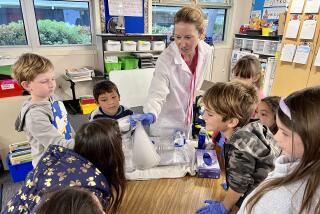Better Math Teaching Needed, Report Says
- Share via
A massive overhaul of math instruction in U.S. schools will be necessary if students are to achieve the skills and understanding required in today’s high-tech world, according to a long-awaited report from the National Research Council, released Tuesday.
The chief goal should be to integrate the teaching of basic computational skills with instruction in the underlying concepts of mathematics, the report says.
“Both of these directions are incomplete without the other,” said Jeremy Kilpatrick, a professor of math education at the University of Georgia and chairman of the panel that wrote the report.
Although the need for both types of knowledge might seem self-evident, bitter battles have been waged over which to emphasize more in classrooms. The fight has pitted traditionalists--advocates of rote and repetition--against those who favor hands-on activities to help students make sense of abstract concepts.
Nowhere has the pendulum swung more fiercely than in California. After several years of favoring a more conceptual approach, the State Board of Education three years ago adopted standards that are more geared to basics. They discourage, for example, the use of calculators by young children, preferring that elementary pupils memorize such basic computational skills as multiplication tables. The board recently approved new math textbooks that tend to emphasize such skills.
Many districts and schools are grappling with how to put together curricula that meet the standards without sacrificing more abstract thinking. The new study offers little specific help there.
“We still don’t have a lot of research pinpointing programs that work versus those that don’t,” said Richard E. Mayer, a psychology professor at UC Santa Barbara who helped write the report.
Kilpatrick, who years ago taught math at a Berkeley middle school, said teachers must look to the real world for help in making math seem more relevant. “If I were a math teacher in California right now,” he said, “I’d be using the energy crisis to help kids look at big numbers like megawatts and kilowatts and ask questions about how you would price electricity.”
The report emphasized that training for teachers will be key to bringing students along. One problem is that many teachers themselves do not like math and are anxious about it.
“We have large numbers of math-phobic teachers,” said Janet Nicholas, a former member of the State Board of Education. “There’s a lot of work to be done.”
Recognizing that many of the state’s teachers are not yet up to the task, Gov. Gray Davis has plowed millions of dollars into professional development. His proposed budget calls for spending $830 million over the next three years to put more than 250,000 teachers of reading and math through intensive training and follow-up.
The math report, called “Adding It Up: Helping Children Learn Mathematics,” was written by a 16-member committee at the request of the National Science Foundation and the U.S. Department of Education. The panel’s charge was to review the diverse research on math learning in preschool through eighth grade and to recommend steps for policymakers.
The influential National Research Council is a nonprofit institution that provides scientific advice under a congressional charter. Three years ago, the council helped settle the emotional battle over how best to teach reading, coming down in favor of a balanced mix of early phonics training and lots of reading.
The math report’s release is timely. After years of emphasis on reading, math has been moving toward center stage of the national education-policy debate.
The report recommends that the nation groom all students to be “mathematically proficient,” mastering much more than disconnected facts and procedures. That goal, the report says, “is an extremely ambitious one” that can be achieved only with systematic modifications to math instruction and new kinds of support for teachers and students.
Among other recommendations in the report:
* Beginning in preschool, educators should offer students the chance to extend their rudimentary comprehension of numbers.
* In subsequent years, the curriculum should link calculations to everyday situations to help students make connections. Numbers and operations should be illustrated in different ways. For example, one-half could be shown as a fraction, a decimal or a percentage.
* Educators should teach important concepts in depth, rather than covering a multitude of topics superficially.
* Significant time should be devoted to daily math instruction in every grade of elementary and middle school.
* Exams should be carefully designed to test students’ progress.
* To help prepare teachers, colleges should create programs that emphasize thorough knowledge of math and the different ways that children learn the subject. On the job, schools should give teachers more time and resources to maintain or acquire understanding of math and improve teaching techniques.
* More scientific research should be conducted on the many new math programs to see which ones are most effective.
More to Read
Sign up for Essential California
The most important California stories and recommendations in your inbox every morning.
You may occasionally receive promotional content from the Los Angeles Times.














